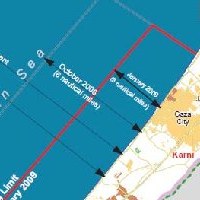![]()
Sun, July 03, 2011 | pajamasmedia.com | by Hadar Sela
Why Freedom Flotilla 2 Didn’t Float
Since its inception the organizers of the Freedom Flotilla 2 — a group of ship-borne activists seeking to break Israel’s partial sanctions on the Hamas-ruled Gaza Strip — have encountered a broad range of largely unrelated technical, legal, bureaucratic, and political difficulties.
While participants claim that they are undertaking a humanitarian mission, since the flotilla is largely organized by radical Islamists and anti-Israel activists at a time when sanctions have shrunk to the minimum designed to limit the weapons and military power of Gaza’s rulers — it seems more of a Hamas support group.
Initial announcements that a 15 to 20 vessel flotilla — including two large passenger ships — carrying 1,500 activists from 100 countries would set sail dwindled, as of the time this article is written, to 327 passengers (over 10% of whom were journalists) from 20 countries sailing on 9 small boats. Lack of funds and public interest may have played a role in the flotilla’s reduction in size as compared to that of its initial stated aims, but undoubtedly the major factor was the sudden and unexpected pull-out of the vessel the “Mavi Marmara” (which also took part in the 2010 flotilla) in mid-June.
The IHH is a radical Islamist group based in Turkey with ties to terrorist groups. In the first flotilla, IHH activists armed with iron bars attacked Israeli soldiers and kidnapped two of them. An Israeli rescue attempt resulted in nine of the Turks being killed.
While the IHH cited technical problems as the reason for the refitted ship’s withdrawal, there is reason to believe that diplomatic pressures and internal Turkish political factors as well as difficulties in obtaining insurance for the voyage may have played a part. Having just won the parliamentary elections, the Turkish government has no need to provoke a major new crisis with Israel and antagonize a U.S. government that seems content to tolerate its other policies.
The UN secretary general’s appeal to the governments of countries in the Mediterranean region to use their influence to discourage the flotilla and the announcement that the UN’s investigation into the previous flotilla has concluded that the naval blockade of Gaza is in keeping with international law no doubt encouraged the European Union and the many individual Western governments which issued subsequent statements dissuading their citizens from participating in the project. Such concerns were not raised prior to the previous flotilla.
U.S. Secretary of State Hillary Clinton went further and described the intended voyage as “not helpful” and provocative after the State Department had issued repeated official warnings to the 36 American participants that they should not attempt to make the journey to the “dangerous and volatile” region, together with reminders regarding penalties under U.S. law for providing support to foreign terrorist organizations.
Legal problems facing the flotilla organizers included severe difficulties in securing insurance for the boats due to major insurers having been approached by the NGO Shurat HaDin (Israel Law Center), which also filed a complaint with the Greek coast guard regarding the suspected lack of seaworthiness of seven of the boats comprising the flotilla. In addition, Shurat HaDin approached the maritime communications company Inmarsat, warning of the potential for damages suits and charges of aiding and abetting terrorism should it provide satellite services to the Gaza-bound ships. The NGO also filed lawsuits against the flotilla on behalf of U.S. citizens.
Public exposure of the connections of some of the flotilla’s organizers to Hamas also caused significant problems for its organizers. Just Journalism detailed the alleged Hamas connections of the European Campaign to End the Siege on Gaza official Mohammed Sawalha, and four Dutch journalists pulled out of the flotilla after having discovered the extent of involvement of the Hamas-linked activist Amin Abou Rashed in the organization of the Dutch-Italian boat. The journalists also complained of lack of transparency on the part of the flotilla organizers.
The internal economic and political crisis situation in Greece, where most of the flotilla’s boats had grouped, brought about a general strike which contributed to the delay in the flotilla’s departure as ports and marinas closed down as a result. In addition, a possible case of sabotage to the propeller of the Swedish-Norwegian boat in Greece and a similar (though disputed) incident concerning the Irish boat in Turkey incurred heavy expense for repairs and necessitated further postponement of departure.
The combination of the various political, technical, and legal difficulties had brought about a situation in which members of the media accompanying the flotilla found themselves waiting in Athens for its departure for almost two weeks. By the beginning of July, some of the journalists had openly stated their intention to abandon the project rather than spend an unknown additional amount of time waiting.
This factor presumably contributed to the decision made by the flotilla organizers to set sail on the afternoon of July 1 with the U.S. boat — the “Audacity of Hope” — despite not having secured the relevant permissions. The journey was brought to an abrupt end by Greek authorities after some 25 minutes at sea when the Hellenic coast guard, aided by Greek commandoes, turned the boat back to a naval port near Athens. The ship’s captain was subsequently detained by the authorities and charged with endangering the lives of the boat’s passengers. Many members of the media, along with some of the passengers, chose to abandon the project at that juncture.
On July 1, the Greek cabinet banned all the vessels comprising the flotilla from leaving port. Apparently some of the flotilla movement’s organizers have now expressed pessimism not only regarding the ability of the current flotilla to get underway, but as to the future of the movement as a whole.
Hadar Sela is an independent writer and blogger living in the Middle East.



 RSS
RSS











Why Freedom Flotilla 2 Didn’t Float | #Israel http://bit.ly/naG4Bm
Why Freedom Flotilla 2 Didn’t Float | #Israel http://bit.ly/naG4Bm